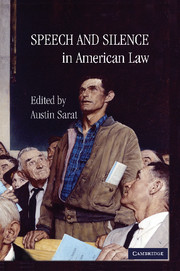Book contents
- Frontmatter
- Contents
- Contributors
- Acknowledgments
- Introduction: Situating Speech and Silence
- 1 “Our Word Is Our Bond”
- 2 Powell's Choice: The Law and Morality of Speech, Silence, and Resignation by High Government Officials
- 3 Anonymous: On Silence and the Public Sphere
- 4 Freedom of Expression, Political Fraud, and the Dilemma of Anonymity
- Comment on Chapter 4 Anonymity, Signaling, and Silence as Speech
- 5 Speech, Silence, the Body
- Index
- References
Comment on Chapter 4 - Anonymity, Signaling, and Silence as Speech
Published online by Cambridge University Press: 04 August 2010
- Frontmatter
- Contents
- Contributors
- Acknowledgments
- Introduction: Situating Speech and Silence
- 1 “Our Word Is Our Bond”
- 2 Powell's Choice: The Law and Morality of Speech, Silence, and Resignation by High Government Officials
- 3 Anonymous: On Silence and the Public Sphere
- 4 Freedom of Expression, Political Fraud, and the Dilemma of Anonymity
- Comment on Chapter 4 Anonymity, Signaling, and Silence as Speech
- 5 Speech, Silence, the Body
- Index
- References
Summary
Introduction
Martin Redish's contribution to this symposium, Freedom of Expression, Political Fraud, and the Dilemma of Anonymity, is a characteristically thought-provoking work. Redish's contribution is literally unsettling: it aims to raise doubts about the merits of anonymity as a First Amendment right, despite the seemingly well-established status of this right.
Professor Redish writes in a typically careful and thoughtful fashion, zeroing in on the danger posed by anonymous speech that is politically fraudulent – that is, anonymous speech that amounts to a “conscious effort to deceive the public solely for political or ideological purposes.” The danger, Redish writes, is that stripping the identity of the speaker from the speech prevents listeners from properly judging that speech and, in appropriate cases, disregarding it for reasons of bias, inaccuracy, and so forth. He writes that “[i]t is a reality of communication that who the speaker is will, in many instances, appropriately affect a listener's perception of and judgment about the expression.” Ultimately, he argues that the “abolition of the right of expressive anonymity is fully justified as a prophylactic means of deterring and diluting the serious First Amendment harms caused by political fraud.”
Professor Redish's contribution adds complexity to an area of First Amendment doctrine – the right to speak anonymously – that, as he notes, has received too little attention from mainstream First Amendment scholarship. This is a fair claim. Still, other bodies of legal scholarship have made useful contributions to at least some of the issues Redish raises.
- Type
- Chapter
- Information
- Speech and Silence in American Law , pp. 172 - 189Publisher: Cambridge University PressPrint publication year: 2010
References
- 1
- Cited by

